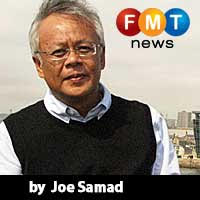Oil royalty or profit-sharing: which will pay more?

Based on 20% royalty, Sabah should get RM2.6 billion, double the current Budget estimate – but with profit-sharing, the amount could be as much as RM4.5 billion.
Joe Samad, Free Malaysia Today
A Borneo daily reported that Prime Minister Dr Mahathir Mohamad has cast doubt over his own announcement in the Dewan Rakyat about the oil royalty issue. The confusion started when Mahathir answered questions from MPs and mentioned oil royalty at the beginning of his answers and later profit sharing in his conclusion.
“Everybody will get 20% of the profit from their area. If their area produces a small amount, then they will have 20% of profit from that area. But it is the profit,” Dr Mahathir told reporters.
East Malaysians rejoiced on hearing “oil royalty” but now it’s “profit-sharing”. There is a big difference between the two and it is important for the respective oil-producing states to seek clarification.
In the Sabah government 2018 Budget, item 45 states that petroleum royalty is expected to increase further to RM1,318 million, which is 31.6% of state revenue. In 2017, due to the increase in prices and production of crude oil and natural gas, Sabah received RM1,246.4 million of petroleum royalty, which exceeded the original estimate of RM985 million. This is the highest amount of petroleum royalty ever received.
If it is to be 20% oil royalty, Sabah could expect to receive double the amount in 2018, i.e. RM 2,636 million as compared to the budgeted figure RM1,318 million.
If it’s to be profit sharing, a lot more clarification is needed about the formula used.
Petronas Group’s revenue, in the financial year ended Dec 31, 2017, increased by 15% to RM223.6 billion compared to RM195.1 billion in 2016. Profit after tax jumped by 91% in 2017 to RM45.5 billion, compared to RM23.8 billion in 2016.
Petronas president Wan Zulkiflee said the company is committed to paying a 2018 dividend of RM19 billion to its sole shareholder, the government, compared with RM16 billion it paid last year.
Profit sharing at 20% of profit after tax for all states would amount to RM9.1 billion based on 2017 Petronas figures.
According to Sabah Shell Petroleum statements, Sabah contributes about 50% of the country’s oil production, and Shell produces 60% of production in the state.
Hypothetically, Sabah should get approximately RM4.5 billion based on being the 50% producer of oil in Malaysia. This is a much better figure than the projected oil royalty of RM1,318 million based on current conditions.
For states with declining oil revenues like Sarawak, profit-sharing is a less favourable option as oil royalty is currently the same across all oil producing states as stated in the Petroleum Development Act.
The debate about which is better, oil royalty or profit-sharing, is making its rounds. Both formulas depend on the performance of a single entity, Petronas. We must look at the long-term perspective of oil in terms of crude oil prices, exchange rates, economic and political factors.
As it stands, profit-sharing seems to be the better option for Sabah and a fairer distribution of wealth based on oil production estimates.
We only have estimates as how oil royalty is calculated, as the process is never transparent.
For example, how does Petronas trade oil: based on daily MOPS (Mean of Platt Singapore) prices or long-term contracts? How much is the shipping and handling costs to customers, etc.
Whether the payment is of oil royalty or profit-sharing, Pakatan Harapan in its 14th General Election manifesto had promised to increase royalties for all petroleum producing states to 20%, with one caveat.
When answering MP Khairy Jamaluddin, Mahathir said: “I did not realise that the member for Rembau regarded the manifesto as a sacred book. However, even if it was assumed as such, we here consider it a manifesto, not so binding that we cannot move. We do not regard the manifesto as the Quran or Bible. So, when we reach a hurdle, we have to find a way to overcome it,” he said.
As far as East Malaysians are concerned, the election promise is cast in stone and Pakatan Harapan’s 20% promise should stand.
What is most important is that we heed Tun Mahathir’s call: that the royalty will be used for the good of these states and not misused to strengthen (political) parties and for other purposes.

